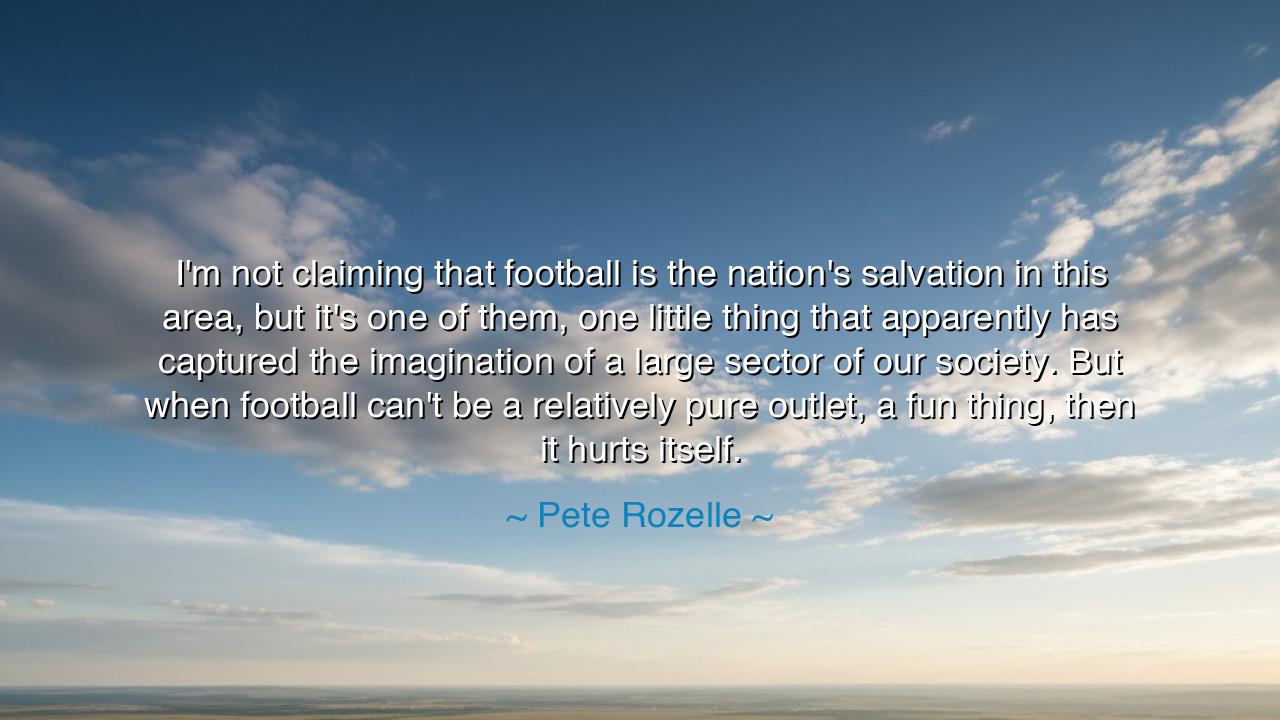
I'm not claiming that football is the nation's salvation in this
I'm not claiming that football is the nation's salvation in this area, but it's one of them, one little thing that apparently has captured the imagination of a large sector of our society. But when football can't be a relatively pure outlet, a fun thing, then it hurts itself.






"I'm not claiming that football is the nation's salvation in this area, but it's one of them, one little thing that apparently has captured the imagination of a large sector of our society. But when football can't be a relatively pure outlet, a fun thing, then it hurts itself." These words, spoken by Pete Rozelle, offer a deeply reflective meditation on the role of football in society and its potential as a cultural force. Rozelle, in his wisdom, acknowledges that while football may not be the ultimate solution to the ills of society, it holds a unique place—a role that transcends mere entertainment. It is a symbol of collective passion, an outlet for the people’s emotions, and a source of shared experience. However, Rozelle warns that when this pure outlet becomes tainted by greed, corruption, or exploitation, it loses its power to uplift and unites only to tear apart.
In every era, societies have sought outlets to channel their collective energy, whether through art, politics, or physical competition. The ancient Greeks, for example, created the Olympic Games as a way to honor the gods and provide a communal space for the expression of human excellence. The Games were meant not only as a competition but as a celebration of unity and the shared aspirations of the people. Like the Olympic Games of the Greeks, football serves a similar role in modern society, offering a stage upon which the public can unite, where individuals from different walks of life come together to support their teams, to feel the thrill of competition, and to revel in the pure joy of sport. Yet, just as the Greeks understood, when the spirit of the event is corrupted, when the joy and competition are overshadowed by ambition and ego, the event itself loses its purpose.
Let us turn our gaze to the example of ancient Rome, where the gladiatorial games were once a powerful symbol of strength, honor, and valor. At their inception, these games were meant to show the might and bravery of the warriors, to embody the best qualities of Roman society. Yet, over time, the games became grotesque spectacles, fueled not by a desire to honor the warriors, but by a need for bloodshed and entertainment for entertainment’s sake. The Roman Empire, in its decline, began to lose sight of the nobility that the games once represented, and instead, they turned into a vehicle for distraction, feeding the masses with empty, brutal pleasures. This degradation of an ancient tradition serves as a cautionary tale: what starts as a pure form of collective expression can be corrupted when the forces of greed and power enter the fray.
Rozelle’s words remind us that football, like any powerful cultural phenomenon, is a reflection of the people’s spirit. When the game is played with respect, with love for the sport itself, it becomes a pure outlet for passion, joy, and unity. But when it is corrupted—by the allure of money, by the pressures of corporate interests, by the drive to exploit players—it harms not only the players but the very essence of what the game represents. The fun, the freedom of the sport, begins to dissipate, and what was once a beautiful expression of human vigor becomes a hollow echo of its original purpose.
Let us look to the example of Muhammad Ali, a figure whose impact on sport transcended the boundaries of the boxing ring. Ali was not just a fighter—he was a symbol, a living embodiment of the ideals that sport could represent: courage, perseverance, and the fight for justice. His career was not without its complications, but throughout it all, Ali maintained a deep sense of respect for the purity of his craft. In the face of political pressure, in the midst of personal trials, he never allowed himself to be simply a tool of entertainment; he remained a symbol of dignity and integrity. Ali, like Rozelle’s vision for football, knew that when sport becomes more than just a business, when it becomes a reflection of the human spirit, it elevates not only the individual but the entire society.
This is the lesson that Rozelle’s words impart to us: that we must be cautious of the forces that seek to exploit the things we hold dear. In our societies, in our sports, and in our lives, we must seek to maintain the purity of those things that give us joy and meaning. Football, like art, like music, like any form of collective expression, should be a vehicle for human connection, not for the advancement of personal wealth or power. The more we allow the corruption of such institutions, the further we stray from their original purpose. The joy of the game, the spirit of competition, and the unity it brings to the people should be preserved at all costs.
In our own lives, let us seek to guard the purity of our pursuits, whatever they may be. Whether it is in our work, in our relationships, or in our passions, we must ensure that these things remain true to their original purpose and not become tainted by the forces that seek to exploit them. Let us engage in life not as passive participants, but as guardians of its beauty, as keepers of the integrity that makes it meaningful. Just as Rozelle reminds us of the sacredness of sport, so too must we honor the purity of all that we cherish, for when we allow it to become corrupted, we risk losing the very essence of what makes it worth pursuing.






AAdministratorAdministrator
Welcome, honored guests. Please leave a comment, we will respond soon